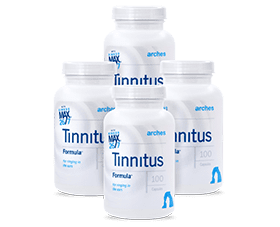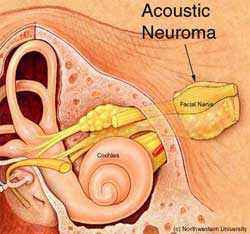By Barry Keate
Barry Keate, has lived with tinnitus over 40 years and has published 150+ research articles on numerous aspects of tinnitus. He is an expert on the condition and a well-known advocate for those with tinnitus.
Researchers at Harvard Medical School have found that taking aspirin may slow and perhaps even halt the growth of a brain tumor called acoustic neuroma. This rare, non-malignant growth causes progressive hearing loss and tinnitus on just one side of the head.
Acoustic neuromas are also referred to as Vestibular Schwannomas as they typically arise from the Schwann cells covering the vestibular nerve. They are not cancerous but can be dangerous as they grow larger, leading to not only hearing loss and tinnitus but eventually dizziness, facial paralysis and, in extreme cases, death.
To date, the only available therapies are surgery or radiation therapy, both of which are associated with potentially serious complications. We published a previous article on Acoustic Neuromas & Tinnitus that discusses the condition and treatment options in depth.
This retrospective study came about because researchers were interested in finding if anti-inflammatory, medications would be helpful in reducing tumor growth. Pro-inflammatory COX -2 is a prominent target of aspirin. COX-2 is also a key enzyme found in high levels in acoustic neuromas. Researchers theorized that aspirin intake would reduce COX-2 enzyme and slow growth. (1)
Patients at the Massachusetts Eye and Ear Infirmary who were diagnosed with acoustic neuroma from January 1, 1980, to April 1, 2012 were included in the study. Of these patients, 347 were followed by multiple MRI scans for at least 4 months.
The 347 patients who had successive MRI scans were questioned about aspirin use. They were required to document use of aspirin to be included in that group. These were patients who were using it for conditions that required long-term aspirin use, such as arthritis, heart attack or stroke.
When tallied, 81 of the patients had been continuous aspirin users and 266 were non-users. Among the aspirin users, 38 took a baby aspirin of 81 mg, 7 took full strength 325 mg and 36 did not specify the dosage.
Results were as follows: Among the 80 aspirin users, 33 (40.7%) demonstrated tumor growth and 48 did not. Among non-aspirin users, 154 (57.9%) demonstrated tumor growth and 112 did not.
The authors found, for the first time, an inverse relationship between aspirin intake and growth rate of acoustic neuromas. Those who took aspirin had less growth; those who did not had more growth.
Some key questions remain that will be examined in future studies:
1 – What dosage of aspirin is most effective?
2 – Is aspirin effective when started at time of diagnosis, or does it help more when a patient has already been on it long-term.
References:
1 – Kandathil CK, Dilwali S, Wu C. et al. Aspirin Intake Correlates with Halted Growth of Sporadic Vestibular Schwannoma In Vivo. Otology & Neurotology 35:353-357, 2014.
Get Free Shipping!
Order now and get free shipping on either the Tinnitus Starter Kit or Combo Pack. Try the doctor recommended products with clinically proven ingredients for tinnitus. No coupon code required.


